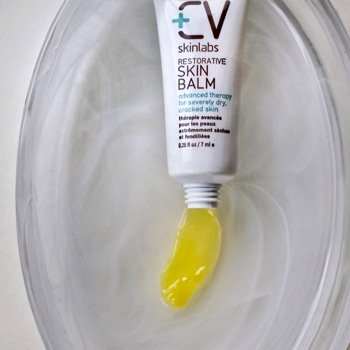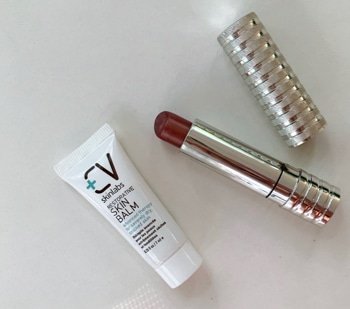
You go to put on your lipstick and ugh! Your lips look awful. Dry, flaky, and dull, and nothing seems to help. What can you do?
Why Do Lips Become Chapped So Easily?
The skin on your lips is unique, in that it is very thin and delicate–much more delicate than most of the skin on your body. That makes it more vulnerable to the harsh effects of winter weather. All that cold air, snow, and wind can dry your lips out quickly.
On top of that, the lips are rarely protected from environmental assaults. Unless you’re wearing a scarf (or mask), your lips are usually exposed to the elements, where they can quickly become damaged.
There are other causes of chapped lips, too. When your lips get dry, you’re tempted to lick them to add moisture, but your saliva evaporates quickly, leaving lips even drier than they were before.
Chapped lips can also be the result of an allergic reaction to a lip product like lipstick or lip gloss. Often it’s the pigments in these products that cause lips to become inflamed, so it’s best to always check a new product on a small section of the lips to be sure it won’t harm you.
Your other skincare products may also be problematic. It’s common to get some of your moisturizers, serums, or other products on your lips when you’re applying them. Acne products and exfoliating products are the most common culprits when it comes to drying out and chapping the lips.
7 Tips to Prevent and Cure Chapped Lips
To make sure your lips stay soft, supple, and comfortable this winter, follow these tips.
 1. Use the right lip balm.
1. Use the right lip balm.
Many lip balms contain mineral oil and other petrolatum products that can contribute to dryness and chapping over time. Other common drying ingredients include menthol, camphor, and phenol.
Use a balm with real moisturizing ingredients like honey, natural oils, beeswax, and natural extracts. We recommend our Restorative Skin Balm because it has nourishing, healing ingredients to instantly soften chapped skin. It also helps to create a moisture barrier that products skin in the future from the harsh elements.
Whichever product you use, take it with you and apply it frequently throughout the day. Whenever you lick your lips, that means the skin is dry, so apply your balm. Then be sure to apply before bed too, to allow your lips to repair themselves overnight.
2. Exfoliate your lips.
You may be in the habit of regularly exfoliating your face, but what about your lips? Once they get chapped, exfoliation is the only way to get rid of that dead, flaky skin. Scrubbing it off will allow the healing ingredients in your lip balm to penetrate more deeply, making it more effective.
Exfoliating your lips also helps prevent you from pulling or picking at any flakes that may be on the skin. Most of us don’t like how those flakes feel, so we pick at them, but that can cause bleeding, cracks, and sores, making things worse. Whenever you notice those flakes, exfoliate instead.
You can exfoliate in a couple of different ways. Some people use a washcloth or toothbrush to gently go over the lips and loosen dead skin. If that doesn’t work, try a sugar scrub. There are many available today, and they can be effective without overdrying as long as they have some oils or other moisturizing ingredients in them.
Exfoliate once or twice a week as needed, then apply a restorative balm afterward to help lips heal.
3. Don’t lick your lips!
It can be hard to break this habit, but if you do, your lips will thank you. Try to be aware of when you do it. If you apply lip balm each time you lick your lips, as suggested above, you’ll gradually get into the habit of applying the balm when your lips are dry, rather than licking them.
4. Protect your lips.
If you’re going out into the cold, windy weather, protect your lips. Wear a scarf or mask that covers your mouth. While we work to reduce the spread of COVID-19, most of us are wearing masks anyway.
Some cloth masks, however, will rub against your mouth and chap your lips. If that happens to you, use your lip balm more often, and try to find a mask made with different materials that won’t dry out your lips. Soft and breathable materials like cotton are usually best.
5. Try a lip mask.
You’re familiar with moisturizing and exfoliating masks for your face. There are many lip masks out there now too that you can use to help your lips heal overnight.
Some of these come in gel patches you wear over your mouth, while others provide a clay formula. Use what feels best for you, or you can make your own using ingredients like honey, yogurt, coconut oil, vitamin E, aloe vera, and/or avocado.
 6. Avoid drying lip products.
6. Avoid drying lip products.
Let’s face it—a lot of lipsticks and lip glosses are drying. You can usually tell within a few minutes of putting them on.
You may be able to get by sacrificing moisture for color on occasion, but during the cold winter months, it’s best to be picky and go with those products that truly nourish while they color. Look for ingredients like aloe, calendula oil, coconut oil, glycerin, hyaluronic acid, other natural oils, shea butter, and ceramides. Avoid those with fragrances and petrolatum.
7. Make water your friend.
Even if you’re slightly dehydrated, your lips will suffer because your body will rob the skin of moisture to send it to more critical organs like the lungs and heart. Make sure you’re drinking enough water throughout the day to help keep lips moisturized.
Then, use water overnight in your room to help your lips avoid drying out. If you breathe through your mouth, which naturally dries your lips, a humidifier can help counteract that effect while moisturizing your throat too.
How do you prevent chapped lips during the cold winter months?

